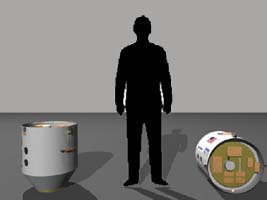 |
Herndon - Jan 28, 2000 -  Paraphrasing "Saturday Night Live", I can say that high school had been very good to me. My original plan was to go to college in Cleveland and not upset my happy home life. But I didn't -- why, I don't know. Wanderlust, probably.
Paraphrasing "Saturday Night Live", I can say that high school had been very good to me. My original plan was to go to college in Cleveland and not upset my happy home life. But I didn't -- why, I don't know. Wanderlust, probably.Just before Thanksgiving during my freshman year at Brown University, my professor, Dr. Christina, said the only thing from that whole year that I remember well 28 years later. He said that most of us would be heading home for the first time since coming to college, and we'd all be very anxious to return to the comforts and love of our previous family lives -- but that we were in for a major disappointment, and we should be prepared for it. We were different now, and we could never go home to that exact place again -- nor should we expect to. Mostly we brush off the things people tell us. So I brushed off Christina and allowed myself the full charge of excitement about seeing my family. But not long after awakening on Thursday morning, it struck me: Christina was right. I was homesick at college, but I was equally homesick at home. The simplicity of the life that I had at home now seemed stifling and without challenge. I entered adulthood on that visit, realizing that I had shed my belief in a single coordinate system by which all of life could be mapped. It goes back to Adam and Eve, really. It's not the apple itself which caused their graduation from innocence, but the realization that they had a choice. Once you have a choice -- no matter which choice you make -- you are not the same person you were when the fact that choice existed hadn't yet occurred to you. Which brings us to the lesson we can take from the collision of NASA's "Better, Faster, Cheaper" imperative with the immovable object of "But It Has To Work". Ten years ago, we were children wandering in space's Garden of Eden. There were military and NASA specs covering every aspect of mission design, development and execution. The rules weren't perfect -- as my life in Cleveland was also far from perfect -- but we all knew and accepted the rules, and we simply strove to adhere to them. If a mission failed, rarely was it a scandal or a disgrace. We had followed the rules -- but not every mission works, so we'll try again. Why did we shed those rules? For the same reason I left Cleveland -- to see what was out there. Space entered the world of choice. We could fly ceramic chips -- or not. Maybe we'll save some money and get a newer, faster chip that's sealed in plastic, which was not a choice before. Maybe we'll not test every subsystem, but bolt the whole spacecraft together and test it as an integrated system. Maybe we'll have redundant radios. Maybe we'll refrain from ribbon cables and press-on connectors. Maybe we'll go surface-mount. Maybe we'll have conformal coating. Maybe we'll impose an approved parts list. And maybe we won't.
Even if we followed the old rules, we did so having chosen to. Now, when missions fail, we ask why in a much more meaningful way. Before, we would simply ask: did we follow the rules? Did we follow them exactly? And we had the mounds of rules and the mounds of paperwork to plow through to get those answers. Now we ask: what choices did we make, and how may those choices have caused the failure? We ask: is this method of building space missions valid? Valid for that mission, but not for this one?
Email This Article Comment On This Article Related Links Space
 Calcutta, India (SPX) Dec 28, 2005
Calcutta, India (SPX) Dec 28, 2005The successful launch Thursday of India's heaviest satellite from spaceport of Kourou in French Guyana may have boosted the country's space research efforts to yet another level, but it has also lifted the spirits of at least three Direct-To-Home televisions broadcasters, one of which has been waiting for years to launch its services in India. |
|
|
|
|
|
|
|
|
|
|
|
|
|
| The content herein, unless otherwise known to be public domain, are Copyright 1995-2006 - SpaceDaily.AFP and UPI Wire Stories are copyright Agence France-Presse and United Press International. ESA PortalReports are copyright European Space Agency. All NASA sourced material is public domain. Additionalcopyrights may apply in whole or part to other bona fide parties. Advertising does not imply endorsement,agreement or approval of any opinions, statements or information provided by SpaceDaily on any Web page published or hosted by SpaceDaily. Privacy Statement |